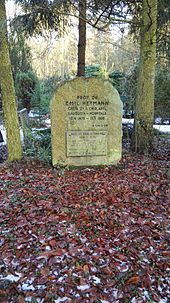Emil Heymann
Emil Heymann (born April 15, 1878 in Altona , † January 11, 1936 in Berlin ) was a German neurosurgeon .
Life
After studying at various universities and completing his doctorate , he trained at the Berlin Charité . In 1921 Heymann took over the surgical department of the Kaiserin-Augusta-Hospital in Berlin-Charlottenburg as chief physician (as successor to Fedor Krause ). In 1930 he became a lecturer for non-tenured associate professor of neurosurgery at the University of Berlin appointed. As a “non-Aryan” he was discriminated against and expelled from the University of Berlin on January 1, 1936. Along with Fedor Krause and Otfrid Foerster, he is considered one of the pioneers of brain surgery in Germany. He innovatively introduced the use of high-frequency currents in cardiac operations. His "electric knife" is still used in the operating room today.
He passed away naturally just before he could start a new career overseas. However, rumors quickly spread that he had committed suicide. He found his final resting place in the south-west cemetery Stahnsdorf in field 3, hereditary burial 90.
Fonts
- On the case history of gunshot wounds to the skull from 1897 to 1902. Dissertation, Munich 1902.
- with Fedor Krause: Textbook of surgical operations based on observations for doctors and students. 2 volumes, Berlin 1912–1914.
- Memorial speech for Emil Seckel Berlin 1924.
- with Fedor Krause: Surgical operations of the head. Translated by Albert Ehrenfried. New York 1933.
literature
- Hartmut Collmann , Detlev Ernst Rosenow: Pioneers of Neurosurgery: Emil Heymann (April 15, 1878 to January 11, 1936). In: Central Journal for Neurosurgery. Volume 65, 2004, pp. 36-39.
- Hartmut Collmann, Detlev Ernst Rosenow: Almost forgotten: Emil Heymann - a pioneer of neurosurgery in Germany. In: Series of publications by the German Society for the History of Neurology. Volume 14, 2008, pp. 407-418.
- Hartmut Collmann: Emil Heymann (1878-1936). In: Ulrike Eisenberg, Hartmut Collmann, Daniel Dubinski: betrayed - expelled - forgotten. The work and fate of German brain surgeons persecuted after 1933. Hentrich & Hentrich, Berlin 2017, ISBN 978-3-95565-142-8 , pp. 82-108.
- Gerold Paul: "Then there was only silence". After almost 70 years, the Jewish doctor Emil Heymann was commemorated in Stahnsdorf. In: Potsdam Latest News from March 6, 2004.
| personal data | |
|---|---|
| SURNAME | Heymann, Emil |
| BRIEF DESCRIPTION | German neurosurgeon |
| DATE OF BIRTH | April 15, 1878 |
| PLACE OF BIRTH | Altona |
| DATE OF DEATH | January 11, 1936 |
| Place of death | Berlin |
